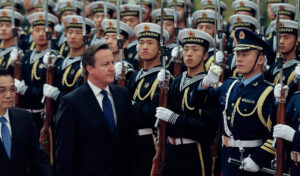Up until the 16th century, China was the most technologically advanced region in the world. While aristocrats ruled Europe, China’s meritocratic literati made exquisite scientific discoveries: gunpowder, the compass, papermaking and printing, among others. Now, China hopes to return to its golden era, with the Chinese state once again fixated on science and technology.
Already, China is unnerving American and European policymakers with its relentless supply of Electric Vehicles. But the EV boom is a symptom of a broader trend, and Beijing is busy masterminding similar revolutions in the fields of electric planes and medicine.
So is China the future of science? The numbers alone are intimidating. There are currently nearly 50 million diligent Chinese students at college today. In 2025, 77,000 STEM PhDs will graduate from China’s universities. Most of these graduates will spend their lives pursuing state-funded research within Chinese institutions. They will be given everything that they need to make scientific breakthroughs.
Yet their success isn’t inevitable. The technological advances that drove Chinese prosperity and civilisation came to an end in 1500AD, giving rise to Cambridge polymath Joseph Needham’s question: “Why did modern science… with all its implications for advanced technology… not develop in Chinese civilisation” which, in previous centuries, “was much more efficient” when it came to applying natural knowledge to practical needs?
In China, debating this question is a parlour game. Many plausibly suggest that the printing-press resistant nature of Chinese characters hindered the spread of mass literacy. Others argue that the nature of China’s educational system, so good at teaching what is known, doesn’t leave enough room for the unknown. And some feel that China’s greatest scientific minds gave up trying because there seemed to be nowhere else to go.
Today, with China’s re-emergence as a scientific superpower, Needham’s question has been revived. Yet even as China builds massive new industries on the back of technological breakthroughs — in batteries, for instance, or telecoms technology — some in the West continue to claim that China cannot innovate due to the nature of its social structure. This seems at odds with the empirical realities of scientific research, as well as China’s lived reality — in many ways, from transport to finance, Chinese society is far more infused with technology than most G7 countries. Most urban Chinese live in cities whose size and technological sophistication rivals or exceeds that of London or New York.
Already, it seems that China’s state-led approach is working. It has, for instance, been highly successful in nurturing China’s Electric Vehicle industry. Why else would the European Union threaten China with EV tariffs of up to 38%? But Beijing’s strategy doesn’t always work: it is far less effective in fields such as AI and life sciences than in physics and engineering.
What explains this apparent inconsistency? Let us recall the Chinese bureaucrat and his English aristocratic counterpart. The founders of Nature, the world’s leading scientific journal, and those other eminent Victorians who did so much to drive the Industrial Revolution, existed in a humanistic and omnivorous intellectual world that was far less specialised than science is today. Western science was driven by brilliant amateurs long into the 20th century: in hindsight, Watson and Crick’s groundbreaking 1953 double helix paper looks more like the notes you take after a brilliant conversation during a drunken lunch, with the illustrations taken from the napkin you stuffed in your pocket. It certainly couldn’t be published today, and back then, it wasn’t even peer reviewed. Those were the days when science was the preserve of absent-minded gentlemen slowly untangling the threads of the world.
The mental world of the English language scientist, from John Milton’s Lucifer to Charles Darwin, and on through to the Silicon Valley tech bros of the present day, is a world driven by insatiable curiosity, rather than state policy. This is why Lucifer is the sly hero of Paradise Lost; the quest for knowledge has always been prized above all else. It was natural for English political thinkers to see society as being a war of all against all, rather than a team effort led by one authority. The English mind “looks down on all that are haughty; it is king over all that are proud”.
These Englishmen were free thinkers precisely because they were landowners, with the time and resources to wander the world asking questions. These free-associative questions are at the heart of scientific breakthroughs, the zero to one of pure intuition. Today, these sorts of breakthroughs — the ones that ask basic questions about why the world is organised in the way that it is — are the preserve of American and, to a lesser extent, English scientific researchers, often those working at startups such as OpenAI rather than within academic institutions. In 2024, Stanford University dropped out of the Nature Index’s top 10 institutions by research output (of which seven are Chinese). That’s not because the researchers of Silicon Valley are losing their touch, but because they would rather win the war of all-against-all that is capitalist competition. They don’t bother to submit their work to Nature anymore — they’d rather go straight to venture capital offices on Sand Hill Road.
But money is not their sole motivation. Elon Musk is surely not indifferent to his fortune, but profit alone cannot explain his Promethean ambition, which resists the authority of America’s feeble government. In this light, it’s not surprising that many in Silicon Valley support Donald Trump. If all you dream about is pushing the boundaries of AI, Trump might appear attractive candidate, as he is less likely than Joe Biden to implement a wave of regulations. Either way, California’s tech bros aren’t cowed by the power of the state. Unlike in China, where the government is the sovereign, America’s true government is capitalism. If the Peter Thiels, Elon Musks and Balaji Srinivasans of the world see the White House as irrelevant and ineffective, who can blame them?
This libertarian, largely unregulated tangle of individuals is up against the state-run colossus that is Chinese science. The micromanaged industry is the offspring of thousands of years of the Chinese keju system, which chose elites based on meritocratic contests: who could memorise the rules most accurately? Unsurprisingly, these elites enforced, and revelled in, the contours of law. The Plan was everything; exile from the state was exile from life itself. (Most famous Chinese poets, from Qu Yuan to Li Bai to Su Dongpo, were fired from jobs as government ministers and took up poetry as a hobby; these men are the only true Chinese analogues to the English gentleman.)
Today, the Chinese system is enormous and fiercely competitive. But those who compare Chinese science to Soviet science are mistaken: their strengths are quite the opposite. The Soviet Union harboured creative figures, such as Vladimir Vernadsky and Nikolai Fedorov, who arguably came up with breakthrough concepts that erred on the side of wackiness, even as they found no structure or system to articulate and realise their work. The Soviets arguably invented the Internet, for instance, but never really scaled it; America’s big consumer market provided the opportunity for that. By contrast, the Chinese didn’t invent EV cars, solar panels or digital payment systems; they merely applied them at the massive scale of China.
For now, China’s skills lie in accelerating the improvement and driving down the prices of technologies others invented, to the point that they spark a global revolution. A comparison can be drawn with interwar German physics, which came to its high point in suburban California, Princeton and the deserts of New Mexico. The Chinese tend not to go from zero to one, rather, they go from one to 100.
It would be wrong, then, to suggest that Chinese research institutions in their current form will displace Silicon Valley anytime soon. Silicon Valley, Oxford’s DeepMind and the biotech clusters near Boston and New York City aren’t really competing with the Chinese Academy of Science. Instead, these visionary individuals are imbibing large quantities of venture capital to create fantastic technologies with no clear commercial application (except for that lucky fraction that make it big time). The Chinese scientists are just completing their homework, using Western creations to solve the problems facing China’s population — whether that’s in the realm of healthcare, cheap energy and food, or preventative adaptation to climate change. In formal terms, one is basic science, the other, applied science.
Eventually, as termites attack a home, the Chinese ability to make inexpensive and high-quality analogues to the products of American stock market champions will undermine the capitalist system’s ability to generate and circulate capital. China will develop products for its own use, and export those products, eliminating the aristocratic monopoly of the West on biotech, high-end manufacturing, computing and all the rest. As the West reacts by seeking to restrain Chinese scientific advances, we will find ourselves rephrasing the Needham question:
Why did China advance so quickly in science in the 21st century?
Because we told them that they could not, and that they should remain inferior.
The lumbering behemoth of China’s state is mobilising, and even though the eccentric visionaries — the latter-day Vernadskys and Fedorovs — will emerge in the United States, China’s vast consumer market will see technology used and applied at a scale that has never been seen before. That is, until Beijing exports it all across the global south. The Electric Vehicle revolution is only the start.
Disclaimer
Some of the posts we share are controversial and we do not necessarily agree with them in the whole extend. Sometimes we agree with the content or part of it but we do not agree with the narration or language. Nevertheless we find them somehow interesting, valuable and/or informative or we share them, because we strongly believe in freedom of speech, free press and journalism. We strongly encourage you to have a critical approach to all the content, do your own research and analysis to build your own opinion.
We would be glad to have your feedback.
Source: UnHerd Read the original article here: https://unherd.com/




